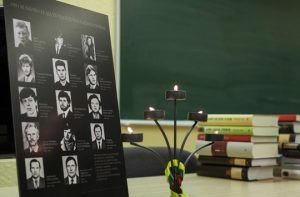- January 14, 2013
- 490
Another anniversary on 13th of January, another occasion to taunt Poles

Yesterday, on the 11th of January at 8 am offices, state-run and educational institutions and many houses displayed burning vigil lights in their windows.
Not only do the lights allude to the bonfires burning in front of the Parliament in January 1991 but they also commemorate the victims of those events. Today, on the 12th of January, the traditional bonfires will be lit under the Vilnius Television Tower (at 4 pm) and on the Independence Square in front of the Parliament (at 6:30 pm), where the commemorative celebrations will be held.
Meanwhile, the fire of historical flames seems to be yet another occasion for Lithuanian extremists to add fuel to the anti-Polish fire. Recently, another “work” written by the professor Alvydas Butkus from Vytautas Magnus University, who is associated with the extreme right wing, Lithuanian Nationalist Union, appeared on a few Lithuanian web portals. He refers to the discussion about the circumstances of January 1991 and presents his own version of these historical events. He focuses mainly on the Vilnius occupation and the Soviet occupation of Lithuania. In his opinion, Russia and Poland are twin sisters united by world power chauvinism, whereas all neighbouring countries, mainly Lithuania, are their victims.
“Old paternalistic traditions and world power chauvinism unite Russian and Polish ideologists” – we can read in the article written by this Lithuanian historian and politician. Butkus combines two viewpoints – one taken from professor Alfredas Bumblauskas and the other from a left-wing politician, Algirdas Paleckis. The author does not name them directly but uses epithets to describe the discussants; the first one is described as “a professor from Vilnius University and television celebrity, who repeats whenever he can, after his Warsaw colleagues, that there was no Polish military intervention in Lithuania on October 1920.”
According to Butkus, the other person that “negates the fact of occupation” is “a famous Lithuanian politician, famous grandson of Bolshevik collaborators with his ‘fellow party members.’” Alvydas Butkus ineptly tries to combine the Bumblauskas’ opinion that in 1920 “Lucjan Żeligowski just gathered some local “old Lithuanians” and headed for Vilnius in order to liberate it from the control of the “Lithuanian-men,” or in other words the “new Lithuanians.” It was not a war but just a local “Vilnius conflict”, and, if we want to follow this kind of logic, “people were shooting to their fellow countrymen”, which is by the way Paleckis’ opinion.
“Invalidating” Bumblauskas’ opinion that Vilnius conflict in 1920 should be perceived as a civil war (“How can people occupy themselves?”), Butkus skilfully operates with some historical examples taken from various places across European and claims that it is possible: “The answer is simple: it is possible and, contrary to appearances, it is not difficult – one just needs to lead foreign army and its generals.
In the same manner – “shooting at one another” – the commies Latvian shooters occupied Latvia in 1919, and Český Těšín occupied “itself” with Polish assistance in 1938, whereas with some German support they also occupied the Czech part of the Sudetes, whose annexation had been already blessed in Munich. It was blessed by the contemporary leaders of European countries and diplomats. Those who negate the fact of Vilnius occupation and justify its annexation, must probably believe that the annexation of the Sudetes was as well legal. (…) And how can you not mention the Georgian Joseph Stalin who “liberated” his country in the similar way in 1921, and Adolf Hitler who did the same with Austria in 1938. (…)”
Speaking about Latvia, Český Těšín, the Sudetes or those remote countries like Georgia and Austria, professor Butkus (maybe unconsciously) forgot about another example of “self liberation” inspired by outside influences, that is about the Klaipėda Revolt whose 90th anniversary will be celebrated in the following days. The revolt was inspired and organised by Lithuanian authorities in Kaunas. Soldiers and Lithuanian volunteers dressed up as civilians rushed to the Memelland on the 9th of January 1923.
In order to justify his opinion, professor Butkus equates the Vilnius campaign with the Soviet occupation whose victims are counted in thousands. Moreover, the professor-politician tries to convince us that “Polish world power chauvinism” was more dangerous than the Russian one: “(…) the Bolsheviks avoided open manifestations of world power chauvinism. (…) Poles did just the opposite – at the beginning of the 20th century, when the nation-state countries were emerging, they always emphasized their mission as regards the neighbouring countries.
Source: http://kurierwilenski.lt/2013/01/14/kolejna-rocznica-13-stycznia-kolejna-okazja-dociac-polakom/
Tłumaczenie Patrycja Olszówka w ramach praktyk w Europejskiej Fundacji Praw Człowieka, www.efhr.eu. Translated by Patrycja Olszówka the framework of a traineeship programme of the European Foundation of Human Rights, www.efhr.eu.

